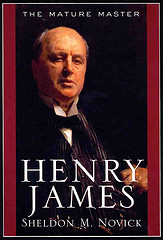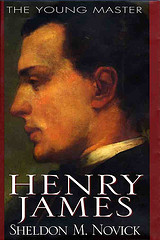Henry James
Justice Holmes
About Me
Blog
Send me an e-mail
Links:
"The Book Show" Interview
Henry James Scholar's Guide to Web Sites
Wikipedia
Linda Simon: "Wild Facts"
Frank Pajares's William James Page
The Constitutional Monarchy Page
Twenty-five
years ago, walking on a beach one summer morning in
Atlantic City, I thought of writing about Justice Oliver Wendell Holmes
and his friends Henry and William James. Without knowing very
much about them, it seemed to me that the two families were admirable
representatives of what one might call the male and female poles of
culture. Holmes, the famously hard-minded materialist soldier and
judge, I had come to admire in law school; the James boys were artists
and men of letters, and while I didn't know much about them, they
seemed to represent a different strand of America thought.
William James was perhaps the brightest the star, intellectually
speaking, in the liberal political firmament, and Holmes was a hero to
many political conservatives; Henry was a motherly nursemaid of
culture. Together, the three friends lived through the
fashioning of post-Civil-War America and helped to create its
government, its literature, its thought, its place in the world.
Much had been written about these famous men; it seemed to me that I
might write some brief, graceful reflection about their complementary
characters and their often adversarial friendship.
Although much had ben written about Holmes, there was nothing like the adequate biography I felt I needed, however. After his death, Holmes's letters and journals were collected at the Harvard Law School, where Mark DeWolfe Howe was given exclusive access to them; Prof. Howe did remarkable work in assembling and preparing many of Holmes's letters for publication, but he regrettably died before getting beyond the early years of the biography. The law school appointed another "authorized" biographer, but he too died without having advanced the project very much; another prospective biographer gave up the notion of writing Holmes's biography when he took his seat on a federal court. I wandered in at that moment to have a look at the Holmes papers and found that the Harvard law faculty had surrendered its protective grip on the archive. It was now open to all comers, and I accordingly sat down to write the first complete biography of Holmes: Honorable Justice: The Life of Oliver Wendell Holmes.
My biography was well received, and I was encouraged to write another. Henry James attracted me more than William as a subject, and I had learned in my research on Holmes that the canonical account by Leon Edel was oddly partial and omitted what seemed to me important aspects of James's life and thought -- omitted indeed the life-long friendships with Henry and William James that so interested me. I did not then know how limited Edel's access to James materials had been, nor the constraints under which he was working. (I have said a few words about Edel and the work of other James scholars in an epilogue to my own book, posted elsewhere on this Web site.)
Life intervened, as it will, and years elapsed before I was able to complete the two volumes of my biography of Henry James. As I was finishing with Henry, an admirable life of William appeared (Linda Simon's Genuine Reality: A Life of William James) and I no longer had any excuse for postponing my effort to write some brief, graceful work that puts the three men into fruitful opposition. But my original notion seemed too simple, now.
Others have lookd at the same period and the same figures, and seen a different moment. The late Felix Frankfurter seemed to have been the first to focus on the "Mataphysical Club," a short-lived and informal conversation club that included Holmes, the James brothers, Charles Sanders Peirce and one or two others, and that met briefly and irregularly in 1871 or 1872 under the benign and tolerant patronage of Harvard Professor Chauncey Wright. The club had its name because the principal topic of discussion was the great metaphysical question of the day, the would-be scientific materialism that was having a fashion in the world of letters. Holmes and Wright were materialists, and spoke of evolution; in later years it was Wright's influence that Holmes remembered. Henry and William James were traditional idealists. William especially had argued metaphyscs with Holmes -- the traces of their late-night debates can be found in their still unpublished letters -- and their arguments were the beginning of the club. Henry was often present at those discussions in Holmes's and the Jameses' bedrooms, of which he later recorded fond memories.
Frankfurter used the Metaphysical Club to give a somewhat misleading impression of Holmes as a pragmatic, early New Dealer, however, and it seems to have been Frankfurter who prompted Catherine Drinker Bowen to give a long fictional account of the club, complete with pages of imagined conversation, in her best-selling Yankee from Olympus (1943). Bowen's account of the club although fictional was highly persuasive, and seems to have influenced later accounts of intellectual history. (See my Honorable Justice pages 476-477.) Mark Howe and others who later gained access to the Holmes papers discredited Bowen's account and doubted the influence of the club, but the story of pragmatism's supposed birth in the 1870s has recently been revived, and seems to have taken on the life of an attractive fable.
Contemperaneous writings of Holmes and the James brothers didn't reflect any discussion of pragmatism. (Holmes's few pragmatic notions were published before the club came into existence.) About twenty-five years later, in the 1890s, Peirce -- having fallen on hard times -- claimed that he had first brought forward in those early conversations the epistemology that was then being developed by him, and independently by others, seeking to establish a priority in the new discipline. Peirce, John Dewey and others went on to propose a new sort of philosophy which William called "pragmatism," generously giving Peirce the priority for which he asked. William became its best-known champion, however, with the publication of his best-selling Pragmatism. William James's version never established itself among philosophers, although it has greatly influenced literary and historical criticism. Tempting as it always is to see the past as a more innocent version of the present, none of the other young men of the Metaphysical Club (perhaops including Peirce himself) had anything like Peirce's later ideas in mind in the early 1870s.
They did have in common a fascination with science and its wild discoveries; but science was ambiguous (as it always is) on the great questions of spirt and meaning. The "magnetic ether" seemed to be the ground stuf of thought and spirit; the survival of the personality after the death of the body a natural phenomenon; mesmerism an application of scientific idealism. Henry and William James were raised in an atmosphere of scientific investigation of religious truths; Ernest Renan's best-selling Life of Jesus was an example of careful empirical study of the historical truths embedded in the New Testament; his investigations of language and culture seemed to establish an idealist taxonomy of races -- one that was to have tragic reverberations in the twentieth century.
Now we have come around at last to Henry Jame's place in this conversation. Henry, too, was entranced by fact. To an idealist, indeed, the great miracles of existence are not the seeming truths of morality and religion, which are commonplace, but their numinous embodiments. The beauty of a human face, the intense experience of an embrace, are rendered with mysterious intensity in James's work. Like Michelangelo's portrayals of nude saints, James's novels are essays in the theology of the body. Not that he was precisely religious, in the usual sense. James never expressed a belief in God. When late in life he wrote of his tentative willingness to believe in the survival of the personality after death, he spoke of this (as William had) as a natural phenemonen; he described seances and other supposed manifestations of the spirit world as possible examples of thought transference, of the communication (always somewhat mysterious) between minds.
Like William, Henry had a profound distrust of systems and absolutes, and felt drawn to his brother's own expression of "pragmatism" when it came late in their joint lives. But he never lost his deep sense of the firm reality of moral principles, and of the continuity of human life and thought over the centuries, which he characterized sometimes as a secret letter passed on from hand to hand, and sometimes as the Word whose embodiment he saw portrayed in Titian's portraits of young men.
How this Word was to be carried forward in an age of democratic revolution was one of his themes. In Henry novel's, it is the ideal young American woman who is "the heir of all the ages," and carries forward the accumlated moral wisdom of the human race. Henry criticizes American men for leaving this task all to unaided women, and he notably takes it upon himself to carry forward his own share, and more, of the treasures of civilization. The institutions of feudal Europe, founded as they were upon violence and injustice, nevertheles are vehicles in which civilization is to be carried forward, and James labors throughout his long life to marry (sometimes literally) the beauties and continuities of material European life with the moral spontaneity of that most highly evolved organism, the young American.
I should not like to give up Holmes's hard-minded materialism, which I share to some degree. But Henry James was right, within limits. Democracy, however necessary, is not enough for a civilization; we can't share masterwork paintings by cutting each into a thousand pieces. There are many things, including human rights and personal privacy, that cannot be voted upon. He had great hopes for museums, universities, and other charitable public enterprises, that he thought could take the place of landed family estates and established churches in carrying forward, into a democratic future, what was worth preserving and necessary to keep of the old civilizations of Europe. While he was a democrat and a republican in his politics, therefore, he admired the surviving institutions of royalty and aristocracy, rendered non-violent and powerless in the American republic. Constitutional monarchy on the British and Dutch models seemed valuable to him, he famously regreted their absence in American life, and at the end of his own life he became a British subject and swore an oath of loyalty to the king. He was a complex man, not easily categorized, but well worth listening to.
These are some of thoughts that occur to me now; perhaps I shall yet write that essay about Holmes and the James brothers, and this in any case is a start.

